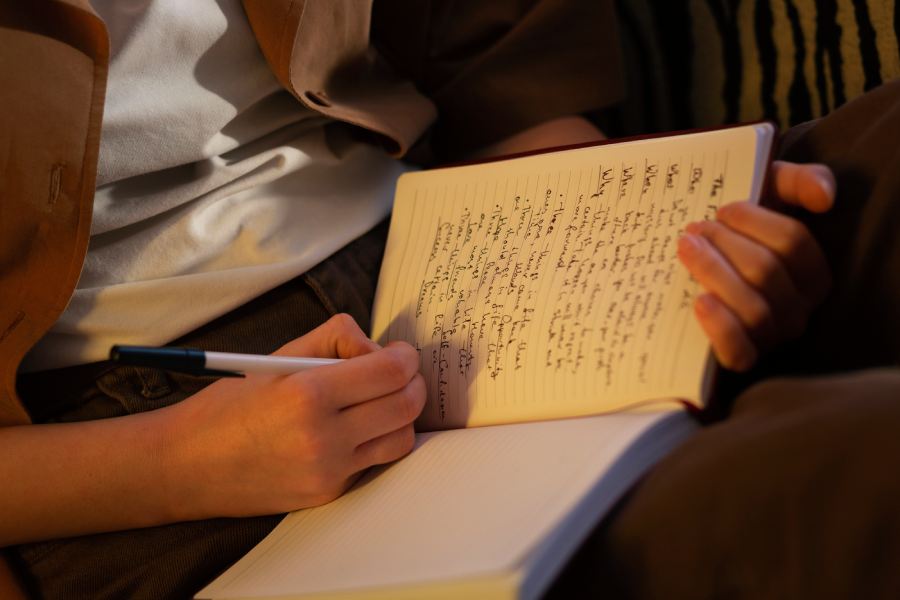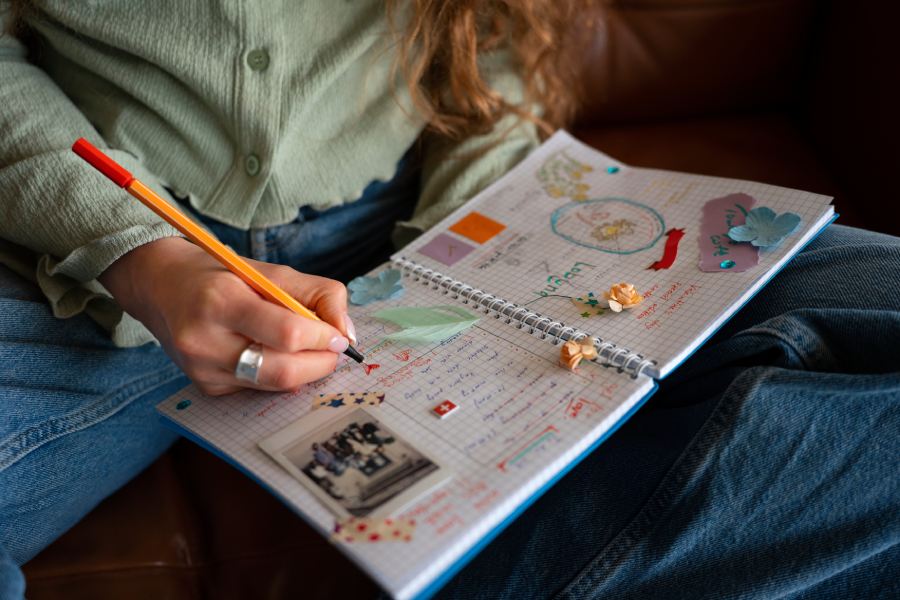There’s something magical about putting pen to paper, transforming abstract thoughts into something tangible. Throughout history, humans have turned to writing as a way of capturing thoughts, emotions, and experiences, laying down the foundation for a concept known as journaling.
Journaling is a concept that may be familiar and close to the hearts of many folks. Some of us may have safeguarded privy diaries somewhere in our rooms as teenagers, serving as a sanctuary to express our struggles, secrets, fears, and feelings.
Welcome to this blog, where we will explore journaling – its benefits, types, why journaling is important, and how to start your own journal.
Before delving deeper into the art of journaling, let’s take a closer look at its significance in our daily lives. Journaling goes beyond merely writing words on a piece of paper – it is a process of self-reflection, a process of finding clarity, and a medium to express ourselves in a ‘sacred space.’ It involves writing down your thoughts and feelings as you navigate the complexities of daily life, and can help you gain insight into, and address your emotions.
Spoken language is a primary medium of communication in counseling and psychotherapy (including LGBTQ psychotherapy, and related), and extensive research has also been conducted on the therapeutic benefits of written language – both to provide self-help information and to elicit personal reflection (Miller, 2014).
Journaling serves as a valuable instructional tool as it encourages individuals to reflect upon and articulate their thinking and problem-solving approaches, aids effective acquisition and transferability of cognitive and metacognitive skills, fosters the identification and analysis of challenges, and visually demonstrates conceptual and perceptual changes for assessments (Fogarty & McTighe, 1993; Perkins, Simmons, & Tishman, 1990; Clarke, Waywood, & Stephens, 1993; Dunlap, 2005a, 2005b).

There are different types of journaling
1. Expressive Journaling
This type of journaling involves the act of expressing emotions through uncensored, unscripted, and unfiltered writing. Engaging in expressive writing can be very helpful when confronting stressful situations as it permits the individual to explore the topics and delve deeper into what is concerning them.
Expressive journaling may provide some form of direction, that prompts the writer to think about deep and emotional experiences. It is a personal experience, and it is important to keep in mind that there is no right or wrong way for its implementation.
This method is well-suited for college students, providing an outlet for stressors and emotions they experience on a daily basis. Research conducted by Pennebaker (1997) and Pennebaker et al. (1990) suggests that this form of journaling can lead to positive health outcomes. It can be especially beneficial to students feeling misunderstood, or isolated, struggling to share their feelings. This provides them with a means of processing their emotions and experiences healthily.
(Pastore, 2020; Pennebaker, et al., 1990; Pennebaker, 1997)
2. Gratitude Journaling
This form of journaling is quite different from expressive journaling. To start, let’s understand what gratitude is – it is a feeling of appreciation and thankfulness – which is a positive and social emotion (Ackerman, 2020).
Gratitude journaling involves jotting down everything you are grateful for, e.g. good health, family, nutritious meals, etc. It can be as structured or unstructured and can be used as frequently as you desire. Once again, there is no right or wrong way for its implementation, and your thoughts should be expressed in a way that is comfortable and suitable for you. You can discuss and elaborate on each point, or stick to brief bullet points about whatever you are grateful for – the choice is up to the writer.
Sometimes we may tend to discount the positive aspects of our lives (Beck, 2011), and gratitude journaling helps keep account of these positive events.
(Pastore, 2020)
3. Visual Journaling
Visual journaling integrates aspects of both narration and artistic expression. The written component of this journal can come in any form, such as free writing, poetry, or bullet points, and merges seamlessly with visual art which can include doodles, sketches, or in-depth creations.
The primary purpose of visual journaling is to combine both components, ensuring that they complement one another. This allows for a diverse experience when exploring topics one chooses to journal about.
(Pastore, 2020)
4. Stream of Consciousness Journaling
“Stream of Consciousness” essentially explains how our thoughts and perceptions flow smoothly from one to the next, highlighting the interconnectedness and unity of our conscious experiences (Krueger, 2007).
According to William James, this type of journaling is characterized by its spontaneous and unstructured nature aiming to capture the continuous flow of thoughts and sensations experienced by individual minds (James, 1890).
This type of journaling offers a unique approach to writing, allowing individuals to capture their thoughts and emotions as they rise, without censorship or filtering anything out. This technique provides a window into the raw and unfiltered workings of our minds, leading to greater self-understanding and personal growth. Additionally, this form of writing has been linked to reduced levels of stress and anxiety, as individuals find catharsis in expressing their emotions (Baikie & Wilhelm, 2005).
Essentially, this type of journaling is perfect to dump out anything you need to get out of your head. For example, setting a timer and jotting down anything and everything that comes to your mind. Don’t worry about spelling, handwriting, or grammatical mistakes – the main purpose is to put your thoughts on paper.

What are the benefits of journaling for mental health?
This simple act of scribbling down your thoughts in a journal has many benefits. Here is a list of some of them:
1. Helps reduce stress
Journaling has been proven to help individuals manage and reduce stress by providing a healthy outlet for expressing emotions and processing challenging situations. This is the reason why most of the corporate psychologists suggest individuals to start journaling to overcome work-related stress.
2. Improved Immune System Functioning
Research suggests that regular journaling may contribute to improved immune system functioning, potentially leading to better overall health.
3. Improved mood/affect
Some studies have shown that expressive writing can have long-term benefits for emotional health. These include improvements in mood, psychological well-being, and reduced symptoms of depression and post-traumatic-stress (Pennebaker et al., 1988; Paez et al., 1999; Park & Blumberg, 2002; Lepore, 1997; Klein & Boals, 2001).
4. Mental Clarity
Writing down thoughts and feelings in a journal can help individuals gain mental clarity, leading to better decision-making and problem-solving abilities.
5. Memory Enhancement
Maintaining a journal can also assist in enhancing memory recall and cognitive processing, which leads to enhanced memory functioning.
6. Goal Setting
Journaling can also provide a structured approach to setting and tracking goals, enhancing motivation and accountability in achieving personal objectives.
(Baikie & Wilhelm, 2005)
How to Start Your Own Journal?
After reading this blog, you may be motivated to start your own journal. Here are some tips which may be helpful in your journaling journey!
- Find a Journal You Love – the first step is finding a journal that you absolutely love, something that is going to motivate you to write in.
- Start Small – your initial journal entries don’t have to be deep. They can simply be a note of the activities you did during the day, and gradually moving towards expressing your feelings, and innermost thoughts.
- Freely express your thoughts – your journal is meant to be yours and yours only. Don’t hesitate to honestly express your feelings and emotions. Write down whatever you are feeling at the moment, and let your thoughts naturally flow onto the page.
- Consistency is key – make journaling a habit by dedicating some time to writing regularly, even if it’s just a few words.
- Experiment – explore different journaling types and styles to find which one suits you the best
- Regularly reflecting – periodically revisit your past journal entries to track your progress and reflect on your life experiences.
- Have Fun! – Enjoy the process of journaling, take time to decorate your journal, experiment with different styles; anything that makes the experience enjoyable and comfortable!
To conclude, journaling is a powerful tool for self-reflection offering multiple benefits including emotional release, and personal growth. Whether through expressive writing, gratitude journaling, stream-of-consciousness journaling, or visual journaling, it provides a multifaceted means of processing your thoughts and feelings.
Starting a journal is as simple as picking up a pen and letting your thoughts freely flow onto a piece of paper – so why not embark on your journaling journey today?
References
Baikie, K. A., & Wilhelm, K. (2005). Emotional and Physical Health Benefits of Expressive Writing. Advances in Psychiatric Treatment, 11(5), 338-346.
Beck, J. S. (2011). Cognitive behavior therapy: Basics and beyond (2nd ed.). Guilford Press.
Clarke, D., Waywood, A., & Stephens, M. (1993). Probing the Structure of Mathematical Writing. Educational Studies in Mathematics, 25, 235-250.
Dunlap, J. C. (2005a). Changes in students’ use of lifelong learning skills during a problem-based learning project. Performance Improvement Quarterly, 18(1), 5-33.
Dunlap, J. C. (2005b). Problem-based learning and self-efficacy: How a Capstone Course Prepares Students for a Profession. Educational Technology Research and Development, 53(1), 65-85.
Fogarty, R., & McTighe, J. (1981). A Cognitive Process Theory of Writing. College Composition and Communication, 32, 365-387.
James, W. (1890). The Principles of Psychology. Holt.
Klein, K. & Boals, A. (2001). Expressive Writing Can Increase Working Memory Capacity. Journal of Experimental Psychology: General, 130, 520-533.
Krueger, J. (2007). Stream of Consciousness. Encyclopedia of American Philosophy, Eds. John Lachs and Robert Talisse. New York: Routledge.
Lepore, S. J. (1997). Expressive Writing Moderates the Relation Between Intrusive Thoughts and Depressive Symptoms. Journal of Personality and Social Psychology, 73, 1030-1037.
Miller, W. (2014). Interactive Journaling as a Clinical Tool. Journal of Mental Health Counseling (2014) 36 (1): 31-42. https://doi.org/10.17744/mehc.36.1.0k5v52l12540w218
Paez, D., Velasco, C. & Gonzalez, J. L. (1999). Expressive Writing and the Role of Alexythimia as a dispositional Deficit in Self-Disclosure and Psychological Health. Journal of Personality and Social Psychology, 77, 630-641.
Park, C. L. & Blumberg, C. J. (2002). Disclosing Trauma through Writing: Testing the meaning-making hypothesis. Cognitive Theory and Research, 26, 597-616.
Pastore, C. (2020). Stress Management in College Students: Why Journaling is the Most Effective Technique for the Demographic.
Pennebaker, J. (1997). Writing about Emotional Experiences as a Therapeutic Process. Psychological Science, 8(3), 162-166. https://doi.org/10.1111/j.1467-9280.1997.tb00403.x
Pennebaker, J., Colder, M., Sharp, L., & Pennebaker, J. (1990). Accelerating the Coping Process. Journal of Personality and Social Psychology, 58(Mar 90), 528-537. Retrieved from https://www.proquest.com/docview/57755967
Pennebaker, J. W., Kiecolt-Glaser, J. K. & Glaser, R. (1988). Disclosure of Traumas and Immune Function, Health Implications for Psychotherapy. Journal of Consulting and Clinical Psychology, 56, 239-245.
Perkins, D., Simmons, R., & Tishman, S. (1990). Teaching Cognitive and Metacognitive Strategies. Journal of Structured Learning, 10(4), 285-303.

